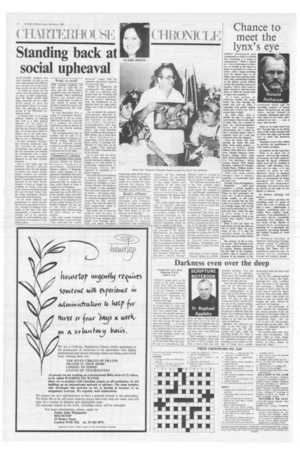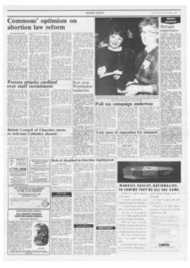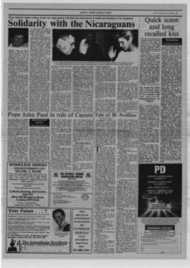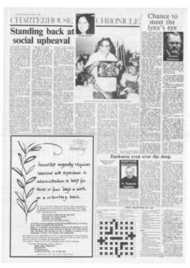Page 10, 23rd March 1990
Page 10

Report an error
Noticed an error on this page?If you've noticed an error in this article please click here to report it.
Tags
Share
Related articles
The Challenge Of Living Our Lives In The Light
Faith From The Living Waters
How God Points The Way From Darkness Into Light
The Fourth Sunday Of Lent 1 Samuel 16:1, 6-7 & 10-13;...
Scripture Notebook
Darkness even over the deep
1 Samuel 16: 1,6-7, 10-13 Ephesians 5: 8-14 John 9: 1-41 TODAY'S gospel gives us the second of the great narrative stories from John, the healing of the man born blind. It is one of the key moments in John's gospel for it so graphically and dramatically illustrates his central theme, the theme of darkness and light.
In the beginning, as the book of Genesis tells us, there was darkness over the deep (Gen 1:2) until God created light. Then came an even greater darkness, the darkness of evil that came when sin entered the world, so that John can say the man who hates his brother . . . is in the darkness (1 Jn 2:1). It was into that darkness that Christ came, a light that shines in the dark, a light that darkness could not overpower (John 1:5).
The vivid dialogue in the story of the man born blind illustrates the sign of contradiction that
Jesus, the light of the world, so often turns out to be. For the Jews failed to recognise him: we know that this man is a sinner, while the man is able to retort: I only know that I was blind and now I can see.
There, perhaps, is the nub of the gospel challenge. Those, like the Jews in John's gospel, who claim to know their way with complete certainty, only lose themselves in the darkness. While those who humbly admit that they are blind, are able to come to the light and see.
There lies the relevance of the story for all who have been baptised. For baptism, once called "enlightenment" in the early days of the church, is the great healing sacrament that opens the eyes of men and women born blind. So that Paul can say in the second reading, you were darkness once, but now you are light in the Lord. He goes on to spell out what this means: Try to discover what the Lord wants of you, having nothing to do with the futile works of darkness.
Baptism, the discovery of faith, is the first step. The following steps are the slow journey into light, made by searching always for what is good and true and generous and just. Doubtless we need a slow unfolding to the fulness of the light of Christ, for a sudden illumination migit be more than we could bear.
But the first imding reminds us that the jouney into light, although slow, i not a solitary path. The story of the Loosing and anointing of David, the youngest of Jesse's sons, as the future king of Lrael has much to tell us. Here isthe child, filled with the spirit the lord, yet having to wait ad search and struggle and sulfer before he came into his kingdom.
Here is the forerunner of Christ himself, the atnointed one, chosen andsent to be the salvation of his eople. Here is the reminder, sunned tp in the responsorial pslm, tat the Lord is ever wh his people, leading them intethe litht: The Lord is my shegterd; there is nothing I shall wnt.
The opening payer rats into words what the journey will entail: "May or fait), hope and charity turn atred :o love, conflict to pease, death to eternal life. Arne."
blog comments powered by Disqus











